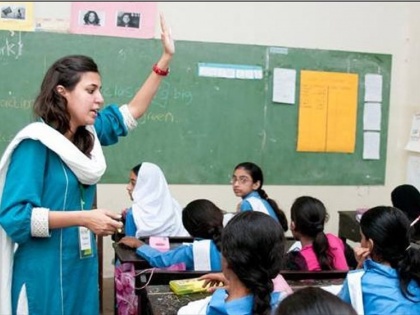Maharashtra govt's News Dress Code Policy Draws Ire from Teachers
By Snehal Mutha | Published: March 16, 2024 09:56 PM2024-03-16T21:56:26+5:302024-03-16T21:58:13+5:30
Maharashtra's recent decision to impose a dress code on school teachers has sparked criticism from teachers who view it ...

Maharashtra govt's News Dress Code Policy Draws Ire from Teachers
Maharashtra's recent decision to impose a dress code on school teachers has sparked criticism from teachers who view it as an unnecessary intrusion and a form of moral policing.
The School Education Department issued a government resolution (GR) on Friday, citing the impressionable nature of schoolchildren as the reason for the policy. The GR outlines specific guidelines, prohibiting jeans, T-shirts, dark-colored clothing, and garments with designs or prints for female teachers. Male teachers are encouraged to wear shirts and trousers, with shirts tucked in.
The policy applies to all schools in the state, both public and private. Teachers argue the dress code undermines their autonomy and that they already dress professionally.
"We did not require this GR; teachers are already wearing the said dress code. Convent or private schools have a flexible dress code. The GR, for more than discipline, creates curiosity in the minds of parents regarding dressing sense. There is not much to take from this; it is just an election gimmick to put out a picture," said a teacher from a public school in Dadar told LokmatTimes.com
School administrators echoed the sentiment, emphasizing the importance of teacher demeanor over attire. A principal of the school said, "It doesn't matter what the teacher is wearing; what is important is how she carries herself. Teachers teach students how to move in society, so we know ourselves what to wear, we are mindful of dressing appropriately, and schools have their own methods of ensuring this." Besides, the dress code represents unnecessary state interference and undermines teacher autonomy.
Another teacher, representing a private pre-primary school in Gorai, raised concerns about the underlying message conveyed by the dress code, particularly regarding gender norms and perceptions of decency. "The dress code just reflects that the saree and Punjabi suit are decent, and the rest of the clothing is decent. This is not what we want to put in the students' mindsets, so why can't we normalize all kinds of dressing? The GR makes no sense, but now that it is issued, we have to follow it." She also mentioned that clothing is all about comfort and how presentable one looks; it should not be mandated.
Critics of the GR argue that it represents an unnecessary form of moral policing and fails to address the root causes of potential negative influences on students. Additionally, some teachers highlighted the strategic inclusion of dress code guidelines for male teachers, suggesting it serves as a token gesture of gender equality while maintaining a focus on regulating female attire.
"It is just a token of equality so that there is no backlash from female teachers. I do agree dressing can influence students' mindsets, especially boys from a higher class, given today's exposure to social media. But by telling women what to wear, you are telling that women's dressing is more provocative than addressing the student's mindset," said a government school teacher based in Borivali.
Open in app